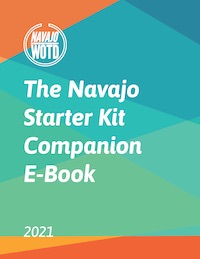t'áá'áko
fine, alright, okay, it is agreeable
tah ah koh
In Navajo, t’áá’áko is translated in a variety of ways. In general, it’s a term that denotes something agreeable, or an accord of some sort.
It could mean ‘okay,’ ‘fine,’ ‘alright,’ ‘it’s good,’ or ‘it’s agreeable.’ That’s the general idea.
A simple phrase would be: “Shił t’áá’áko,” meaning “It’s alright with me.”
In question form, you could use the -ísh- particle to inquire if something is agreeable, such as an action or condition. “Shíká anilyeed, t’áásh’áko?” is another informal phrase meaning “You will help me, won’t you?” You can get a sense of what the term conveys.
Remember, in conversation a person may begin a sentence with ya’ or else end the statement with da’ in order to ask a question. These are the ways you can ask questions with the expected answer being a yes or no.
